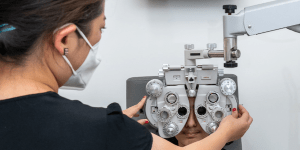1:30min
 The Entry-level Competency Standards for Optometry have been revised to reflect contemporary best practice and meet community eye care needs.
The Entry-level Competency Standards for Optometry have been revised to reflect contemporary best practice and meet community eye care needs.
A steering committee, facilitated by Optometry Australia’s Optometry Development Manager Ben Hamlyn, consulted with industry stakeholders, optometrists and the wider public to oversee the revision of the new standards. This set of competencies is the sixth generation of the Entry-level Competency Standards for Optometry since they were first published in 1993.

‘As a profession we must continually review and update the skills and attributes we expect from those entering practice as an optometrist,’ Ben explains.
‘Community and patient expectations and eye care needs evolve over time, and it’s important that the standards at which optometrists practise are adapted to keep up with these changes.
‘These competency standards are developed in consultation with registration and accreditation authorities and optometry educators. They provide clarity for students, practising optometrists, other health professionals, those seeking to be registered as an optometrist in Australia, governments and the community about what is expected of an entry-level optometrist.’
Key revisions to the Entry-level Competency Standards for Optometry
The main revisions made to the competency standards include:
- Redesigning the units into five domains of competency;
- the increased focus on culturally responsive and culturally safe care; and
- the reduction in its level of detail.
‘The new domains highlight the important, broader aspects of being a health professional, and should be considered in a holistic way. Optometrists may need to integrate components from all five domains appropriately and simultaneously in a single interaction to be competent,’ Ben said.
Certain criteria, such as risk management, ethical behaviour, communication and dedication to personal development and learning, have been assigned to separate domains to emphasise that they are all crucial elements of being a competent and holistic practitioner. Skills and attributes that are specific to providing clinical care have been brought into a single domain.
The level of detail in the revised Entry-level Competency Standards for Optometry has also been reduced to align with best practice for competency frameworks. Describing all the circumstances that indicate competency in a particular aspect of the standards is impossible, and attempting to do so results in the atomisation of competence into numerous discrete items, which, ultimately, cannot fully describe what is required of a competent practitioner. Atomisation takes away from the concept that a competent practitioner should be viewed holistically rather than the sum of many small aspects of competence.
Based on feedback from stakeholders, the steering committee also determined that the culturally responsive and culturally safe practice expectations for optometrists entering the workforce should be strengthened in the entry-level standards.
‘It’s a community expectation that healthcare providers will practise in a way that is inclusive and culturally responsive. A holistic, patient-centred approach to practice requires culturally responsive practitioners,’ Ben said.
The document specifically acknowledges the need for optometrists to enhance their cultural responsiveness and competency for practice with Aboriginal and Torres Strait Islander peoples, noting that the ongoing effects of racism and discrimination on Aboriginal and Torres Strait Islander peoples must be recognised to ensure the delivery of safe, accessible and responsive care.
It also highlights Australia’s culturally and linguistically diverse community, stating that in order to be a competent practitioner, optometrists must practise in a respectful, collaborative and culturally responsive manner. It further recognises the need to continually review and modify how healthcare is delivered within cross-cultural environments.
Download a copy of the Entry-level Standards for Optometry here.
Any Optometry Australia member with questions about the Entry-level Competency Standards for Optometry can contact our Optometry Advisor Help Desk by email at national@optometry.org.au and phone (03) 9668 8500.
Tagged as: Career, Indigenous eye health, Students, Universities